
Quantum Computing
Beginners Simple Introduction To Quantum Computers
Quantum computing is a type of computing that is based on the fundamental principles of quantum mechanics to perform calculations. We are all familiar with how classical computer works.
In a classical computer, information is processed using bits. Bits are referred in Binary which can be in one of two states (0 or 1). However, in a quantum computer, information is processed using quantum bits, or qubits.
Quantum computing approach is different as compared to classic computing. It is a type of computing that make use of quantum-mechanical phenomena such as superposition and entanglement, to perform operations on data.
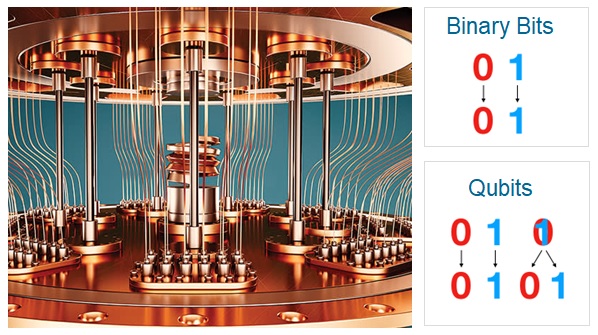
However, in a quantum computer, information is stored and processed using quantum bits or qubits, which can exist in multiple states simultaneously, a property known as superposition.
In a classical computer, information (data) is stored and processed using binary digits or bits, which can exist in one of two states: 0 or 1. However, quantum computers can also represent data in qubits or quantum bits in addition to binary bits.
Unlike binary bits, the qubits, which can exist in multiple states at the same time. This property, known as superposition, allows quantum computers to perform certain calculations much faster than classical computers.
Significance Of Quantum Computing
Quantum computing has the potential to revolutionize computing and solve problems that are intractable for classical computers. The classical computers are also quite powerful and have made significant advances over the past few decades especially in the computer hardware technology. However, there are still some problems that classical computers are not considered very efficient in solving these problems.
One of the main advantages of quantum computing is its ability to perform certain type of calculations much faster than classical computers. This is particularly true for problems that involve large amounts of data or complex algorithms. For example, quantum computers could be used to factor large numbers, which is important for cryptography, or to simulate complex chemical reactions, which could have applications in the field of medical science.
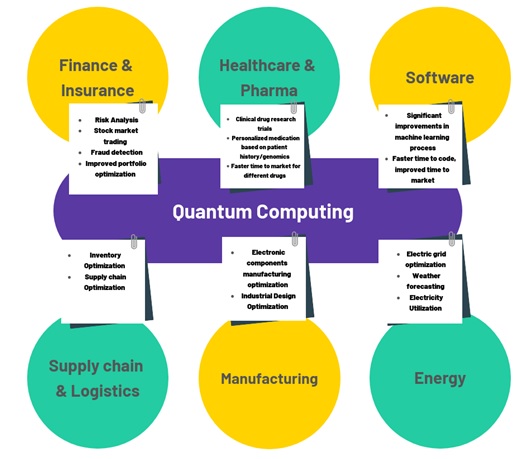
In addition, quantum computing has the potential to transform fields such as finance and logistics by enabling faster and more efficient optimized algorithms. Quantum computers could also be used to improve machine learning algorithms, which are used for tasks such as image recognition and natural language processing.
However, quantum computing is still in its early stages of development, and there are many challenges to overcome before it can be used for practical applications. Nevertheless, researchers are continuing to explore the potential of quantum computing, and there is a lot of excitement about the possibilities that this technology could bring in the future.
What Is Quantum Mechanics ?
Quantum mechanics is a branch of physics that studies the behavior of matter and energy at the smallest scales. It is a fundamental theory that underlies much of modern physics and has led to many technological advancements, including the development of the transistor and the laser.
At the heart of quantum mechanics is the concept of the wave-particle duality, which states that particles, such as electrons and photons, can exhibit both wave-like and particle-like behavior depending on the circumstances. This duality is described by the Schrödinger equation, which is used to calculate the probabilities of different outcomes of an experiment.
Another important concept in quantum mechanics is superposition, which states that a particle can exist in multiple states at the same time. For example, an electron can exist in a superposition of two different energy states, which can lead to interference effects.
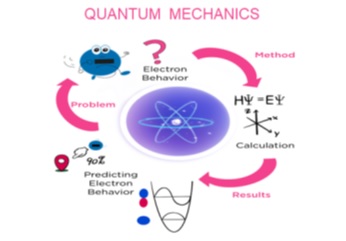
Entanglement is another important concept in quantum mechanics. It refers to the correlation between the states of two or more particles, even when they are separated by large distances. This property has led to the development of quantum information and cryptography, which rely on the ability to create and manipulate entangled states.
Quantum mechanics is a complex and often counterintuitive theory, and it has led to many interesting and unexpected phenomena, such as quantum tunnelling and quantum teleportation. While quantum mechanics can be difficult to understand, it has profound implications for our understanding of the universe and has led to many technological advancements that have transformed our lives.
Quantum mechanics is a fundamental theory in physics that describes the behavior of matter and energy at very small scales, such as atoms and subatomic particles. It uses the concept of wave-particle duality to explain phenomena like the quantization of energy and the uncertainty principle.
It provides a mathematical framework for predicting the probabilities of various outcomes of experiments, rather than definite outcomes. Quantum mechanics has applications in fields such as quantum computing, quantum cryptography, and quantum field theory.
Concept of Superposition In Quantum Computing
Superposition is a fundamental concept in quantum mechanics and is one of the key features that differentiates quantum computing from classical computing. In quantum computing, a qubit can exist in a superposition of two or more states. This allows data to be represented in multiple values simultaneously.
In classical computing, a binary bit can only be in one of two states, either 0 or 1. However, in quantum computing, a qubit can be in a superposition of both 0 and 1 at the same time. This means that a single qubit can represent both 0 and 1 with different probabilities.
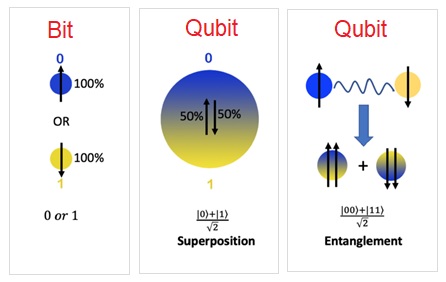
When multiple qubits are combined in a quantum computer, they can exist in a superposition of many possible states. This allows quantum computers to perform certain type of computations much faster than classical computers, such as factorization and searching unsorted databases.
However, superposition is possible only in quantum state. Therefore, superposition is also a fragile phenomenon and can be easily disrupted by external interference, such as noise or measurement. This makes quantum computing challenging, as it requires specialized computer hardware and algorithms to maintain the delicate quantum states.
The concept of superposition is a fundamental concept in quantum computing and plays a crucial role in enabling quantum computers to perform certain computations faster than classical computers.
Concept of Entanglement In Quantum Physics
Entanglement is another important fundamental principle in quantum computing that describes a strong correlation between two or more quantum particles. When particles become entangled, their quantum states are intertwined in such a way that the state of one particle cannot be described independently of the others. This means that measuring the state of one entangled particle instantaneously determines the state of the other(s), regardless of the distance between them.
Entanglement is crucial for various quantum computing tasks, such as quantum teleportation, superdense coding, and quantum error correction. It enables the creation of quantum gates and algorithms that exploit the collective behavior of entangled particles to perform computational operations more efficiently than classical computers.
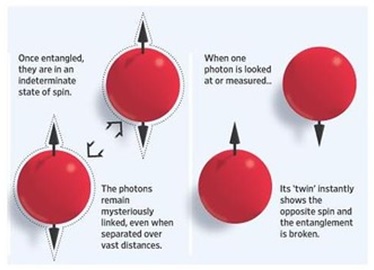
Quantum entanglement has been experimentally observed and demonstrated through various systems, including photons, atoms, ions, and superconducting circuits. It serves as a foundation for many applications in quantum information processing and plays a pivotal role in the potential advantages of quantum computing over classical computing.
What Is Quantum Algorithm ?
An algorithm is a set of instructions or a step-by-step procedure for solving a problem or accomplishing a specific task. Algorithms are used in many areas of computer science, including software development, data analysis, artificial intelligence and also quantum computing.
A quantum algorithm is a computer algorithm designed to be run on a quantum computer. It is a type of computer that uses the principles of quantum mechanics to process information.
Unlike classical computers, which use binary bits. Binary bits can be either be 0 or 1, whereas, quantum computers use qubits that can be in a superposition of states, allowing for a larger range of possible computations.
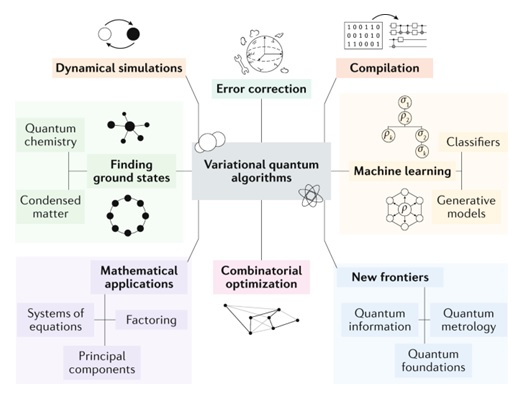
Quantum algorithms can be used to solve certain problems faster than classical algorithms, such as factoring large numbers or searching unsorted databases. One of the most famous quantum algorithms is Shor’s algorithm, which can factor large numbers exponentially faster than the top performance known classical algorithm.
However, quantum algorithms also require specialized computer hardware to run, and current quantum computers are limited in the number of qubits they can handle and the amount of noise and errors they introduce. As a result, quantum algorithms are still in the early stages of development and are not yet widely used in practical applications.
Join The Best Seller
Computer Science Online Course
This is the most comprehensive and unique Computer Science And Programming Fundamentals course Online which will give you in depth understanding of most important fundamental concepts in computer science And Programming .


